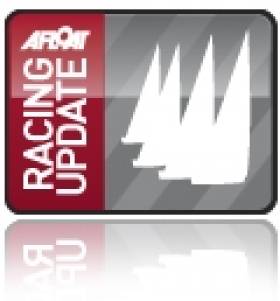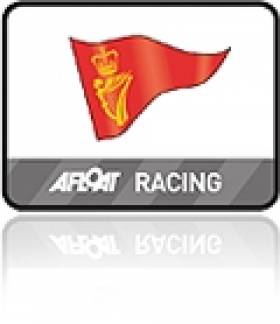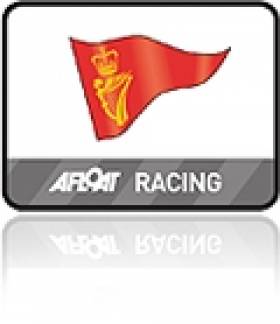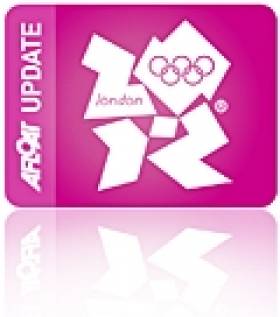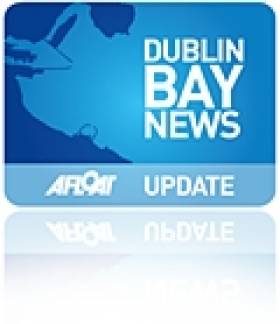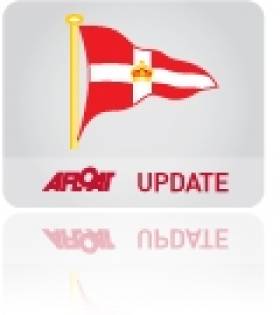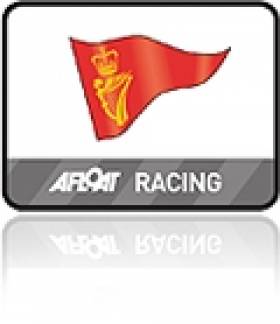Displaying items by tag: Royal
An exotic weekend in Dun Laoghaire with the start of an Olympic class keelboat event plus the arrival of a Volvo 70 into the harbour but Irish weather meant all did not go to plan. Click our links for a round up of the weekend's sailing events from around the country: Mansfield Wins 1720 Euros in Baltimore, Squall Puts Paid to First Race of Star Europeans in Dun Laoghaire, West Kirby Teams Top ISAF Worlds in Schull, Johnston's Beneteau 31.7 is Good Prospect, Killyleagh Pair Scoop Flying Fifteen East Coast Cup, Lively Lady Sails to Victory in Fickle ISORA Race to Rockabill, SB3 Team Sanya Welcome Scuppered by Strong Winds. We'll have more reports later this morning from the J24 Easterns in Howth, the National 18 season in Cork and J80 Match racing.
Royal Cork Autumn League Entry fee Reduced to €90
Lift out Scheduled for October 15th
Ellida Wins Cork Harbour Class One
The fifth race in the Royal Cork O'Leary Insurances sailing League was a quiet affair weather wise in Cork Harbour last night writes our Cork Harbour Correspondent. The highlight of the evening was watching the 92,000 tonne Cruise Ship Costa Deliziosa passing East of the fleet (heading South out the harbour after her visit to Cobh) during the race start sequence.
The breeze came from a Southerly direction at 6 to 10 knots. The start was about 1 and a half hours before High Water. The light winds and strong spring tide made the course more interesting. The Race Officer Mel Collins set a nice course for all Classes and again managed to get everyone home before sunset!
Results Summary:
1st in White Sail IRC Ian Hickey's Granada 38 "Cavatina"
1st in White Sail Echo Batt O'Leary's Sun Odyssey 36i "Sweet Dreams"
1st in Class 3 IRC Jimmy Nyhan & Maritta Buwalda's 1/4 Tonner "Outrigger"
1st in Class 3 Echo Jimmy Nyhan & Maritta Buwalda's 1/4 Tonner "Outrigger"
1st in Class 2 IRC Kieran & Liz O'Brien's MG 335 "Magnet"
1st in Class 2 Echo Kieran & Liz O'Brien's MG 335 "Magnet"
1st in Class 1 IRC Ria Lyden's X332
Sharkbait Takes Another Bite at Royal Ulster.
Howth's Ben Duncan sailing Sharbait has etched another victory in the SB3 class following a weekend of very up and down conditions with some sizeable shifts and changes in pressure at the SB3 Northern Championships at Royal Ulster Yacht Club.
But the PRO team were well able and a full schedule of racing was completed on the Lough. Three of the top four Irish boats from the Worlds took three of the top four spots and had pace on pretty much every one, a further indication that going to Torbay has definitely given these boats a lift.
The Vaughan brothers continued their upward trajectory with a very solid second place. Andrew Ageo had a win in race 2 and pretty steady results to finish third. Dave Cheyne had an up and down regatta. The local sailors was very fast in patches but got buried a couple too many times to challenge.
Sharbait was lucky enough to not have to make too much of the conditions and sailed the fleet to produce another overall win.
Highlights of the weekend for the winners were winning the first race by 2:30 minutes and getting caught up in a match racine with Dave Cheyne for race 3. Cheyne pipped the Howth boat on the line by about a foot.
The next event in the SB3 calendar is the national champs in four weeks time. Flipper and Mel Collins are expected to be back in the fleet along with plenty of further competition.
1st Sharkbait
2nd Toucan 3
3rd Flutter
4th Team Cheyne
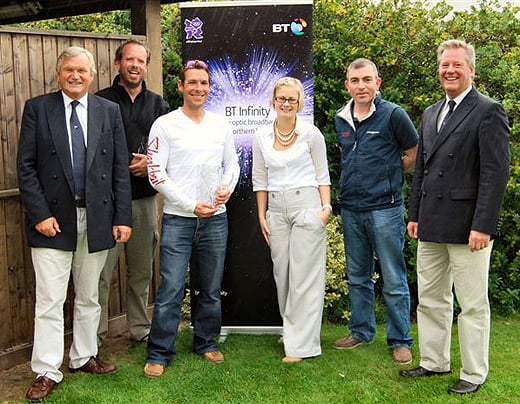
Royal Ulster presents Sharkbait their winning prize. Photos: Ken Hunter
British Olympic Gold Medallists to Contest Dun Laoghaire Event
Olympic trial winners Royal Cork's Peter O'Leary crewed by Malahide's David Burrows, who finished fourth at the Pre-Olympic regatta in Weymouth a week ago, lead a home challenge in a fleet that contains the current Olympic champion, four past world champions and seven continental class champions.
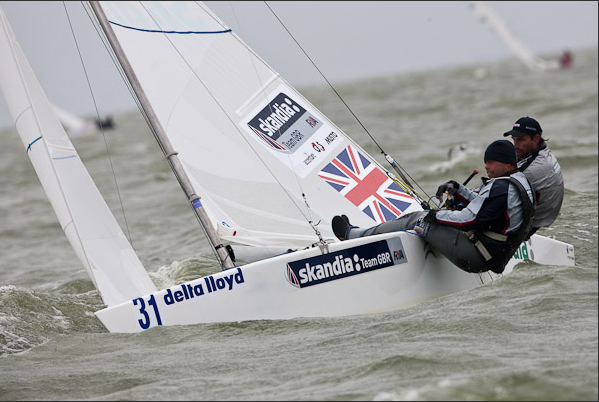
British Olympic Gold Medallists Percy and Simpson are coming to Dublin Bay next month. Photo: Delta Lloyd Regatta /Sander van der Borch
Beijing Gold Medalists, Britain's Ian Percy and Andrew Simpson, are confirmed for the presitgious Olympic class event that starts at the Royal St. George YC on September 2nd.
Ireland's other entry is Olympic triallists Max Treacy and Anthony Shanks from the host club.
The entries for the 2011 Star European Championships are:
| Skipper | Country | Sailing Number |
|---|---|---|
| Chatagny | CH | SUI 8075 |
| Niklaus Michel | CH | SUI 7829 |
| Alexander Schlonski | DE | GER 8426 |
| Maxwell Treacy | IE | IRL 8381 |
| Mateusz Kusznierewicz | PL | POL 8417 |
| DENIS KHASHINA | UA | UKR 8205 |
| Andrew Campbell | US | 8423 |
| Ante Razmilovic | UK | 8191 |
| Johannes Polgar | Germany | 8414 |
| Arthur Anosov | UKR | 8240 |
| Andrey Berezhnoy | Russia | 8359 |
| Barbara Beigel Vosbury | 7986 | |
| Fernando Echavarri | Spain | 8209 |
| Flemming Soerensen | Danish | 8225 |
| George Szabo | US | 8434 |
| Guillaume Florent | France | 8270 |
| Lev Shnyr | Russia | 8047 |
| MARIN LOVROVIC | Croatia | 8339 |
| Pavlo Bondar | UKR | 8119 |
| Tom Londrigan, Jr. | US | 8170 |
| Vasyl Gureyev | UKR | 8247 |
| Xavier ROHART | France | 8237 |
| Mate Arapov | 7287 | Croatia |
| Richard Clarke | 8361 | Canada |
| Stuart Hebb | 8427 | Canada |
| Tom Lofstedt | 8351 | Sweden |
| Diego Negri | 8266 | Italy |
| Peter O'Leary | 8418 | Ireland |
| Tibor Tenke | 8386 | Hungary |
Royal Irish Yacht Club Celebrates 180th Birthday
'Tales of the High Seas' - with Theo Dorgan
The Poet-adventurer Theo Dorgan comes to the RSt. George Yacht Club, Dun Laoghaire as an after dinner speaker to discuss his recent book, Time on the Ocean. This is an inspired description of how Dorgan flew to southern Chile and joined the crew of Pelagic Australis, a 70ft single mast yacht, for the voyage to Cape Town. Sailing more than 4,000 miles with 10 strangers involves immense difficulties, but Dorgan conveys with poetic simplicity his joy in facing this extraordinary challenge. The event "Tales of the High Seas" - with Theo Dorgan is a RSGYC Supper event. It's on Wednesday 7th September at the Royal St George and it is open to the public.
at 7.30pm. Tickets are €25 – includes supper – available from www.Paviliontheatre.ie Tel:-01 2312929
Ireland Fails to Conquer the World at Match Racing Challenge
A very experienced International line up, led by individual winner David Chapman (AUS), resulted in The World retaining the title they won last year. While the margin of victory was great, they were strongly pushed by a young Irish team who on paper were ranked far lower in the World Rankings. The final margin of victory was 29 points to 16.
An exciting part of the event's entertainment package allowed individuals to actually experience the racing as it happened by sailing on board with a team in the "Hot Seat" position. Edel Edwards, who lives in Dublin, had never sailed before but stepped into the "Hot Seat" on Saturday not knowing what to expect. She sailed with both George Kingston's team (IRL) in Flight 7 and Sam Pearson (GBR) in Flight 8, and said that the experience surpassed her expectations, "Both teams were really welcoming and being so close to the action was fantastic. It was one of the most amazing experiences of my life." Edel loved it so much she has decided to do an adult sailing course in the Royal St. George Yacht Club so that she can get out racing again soon.
Final Results:
1st David Chapman Australia World No. 43
2nd Sam Pearson Great Britain World No. 153
3rd Nicolai Sehested Denmark World No. 42
4th George Kingston Ireland World No. 877
5th Marty O'Leary Ireland World No. 395
6th Robbie Allam Great Britain World No. 79
7th Ben Duncan New Zealand World No. 200
8th Darragh O'Connor Ireland World No. 1323
9th Ben Scallan Ireland World No. 1674
10th John Downey Ireland Unranked
Tingle's 'Alpaca' Wins Class Two of Union Chandlery League
There were concentrated faces last night in Cork Harbour where the Royal Cork fleet had a windy evening of racing in the Union Chandlery June League.
Brian Heffernan's Dufour 365 Aisling was first in the in White Sail division. Class 3 went to Jimmy Nyhan and Maritta Buwalda in their Quarter Tonner Outrigger. Class 2 winners were Paul and Deirdre Tingle's First 31.7 "Alpaca" and in Class one the honours went to Robert O'Leary in his modified 1720 Antix Beag.
Concentration this morning now turns to the first race of the ICRA National Championships being held in Crosshaven.
The wind was southwesterly at about 20 knots gusting to 30. Race officers set an excellent course (No.70). It was a clean start at the top of the tide, with a beat to the cage.
Those that kept to the south made the right call. It was then a run to No.7 where we gybed and headed for No.13 Some were brave enough to carry spinnakers with some interesting results both good and not so good. A number of Irish Naval ships at anchor off Spike Island.
After No.13 the fleet had a fetch back to No.9 and then a beat back to Cage. With the tide now ebbing it paid to go down the middle. We rounded Cage once again with a run back to No.7 more spinnakers up this time. After rounding No.7 the fleet had a nice beat home.



























